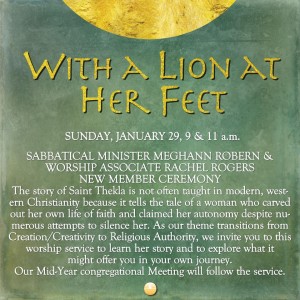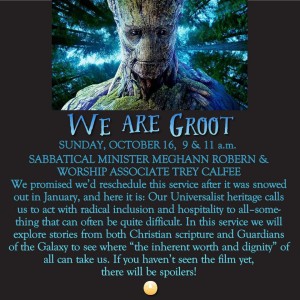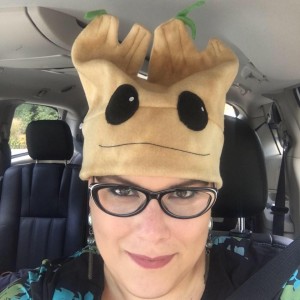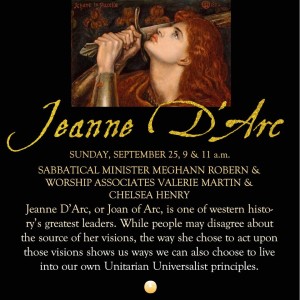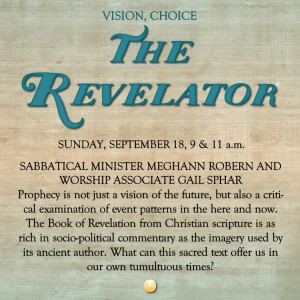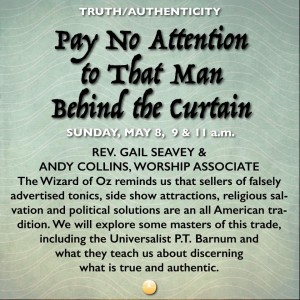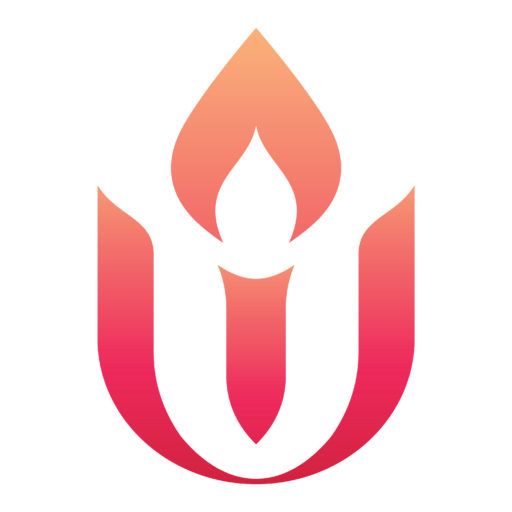Listen to the sermon here:
or watch and listen to the sermon on Facebook.
Thekla. A young woman, caught up in a culture wherein she is denied all control over her life. Her mother makes her decisions for her, and she is engaged to a man who believes he is entitled to her submission — something which is validated by all those around them. Thekla has been denied affirmation of her inherent worth and dignity.
But then, she is given the chance to hear the teachings of Paul. She hears someone speak of love that rises above all injustice, of equality that knows no sex or gender. She hears a voice telling her that she is a person and not a thing. For teaching her this, Paul is thrown in jail. Think about that. Think about how powerful words can be, and how dangerous they are to people who hoard and abuse their power.
Regardless, Thekla has tasted freedom, freedom of her heart and freedom from her chains. Neither her mother nor her betrothed find that they can control her anymore, and while Paul is merely imprisoned, Thekla’s own mother asks for her to be burned. People oppressed by a system are most often taught that they must collaborate willingly in the system in order to survive.
Now, I know this story has some miracles in it. I’m not asking you to take them literally. What I want to do is invite you to consider them as metaphor for the immense power of the religious community to love, and protect, and change the fabric of the world around us. Thekla is saved from the pyre by an outpouring of rain; we learn that Paul and his people were actively praying for her deliverance.
What would it take for us to become the rain — single drops, each of us, overwhelmed by the magnitude of putting out a raging fire. And yet, when joined together, we become a downpour, extinguishing fires of hate and injustice. Rabbi Shana Mackler, of the Temple, taught me a saying that has become essential to my spiritual life this last week. “Pray as if everything is up to God. Act as if everything is up to you.”
Prayer, of course, means different things to different people. And maybe you’re not the kind of person who finds prayer to be very useful in your life. But I would offer up that because prayer can take so many different forms, and that one of those forms is to act as a direct conduit to our conscience, that maybe it’s not so irrelevant to all of us in these times. The Sikhs go to daily prayers because they believe that hearing and chanting the words of the Guru Granth attunes them to the needs of the universe each day. Prayer can be engaging with our personal gods, or with our still, small voice. However your personal spiritual journey has, and continues to unfold, prayer is not about quieting and soothing the mind, like meditation, but rather is about actively engaging your inner self to help choose the course of your outer life. This religious community offers up a mission, and shared values, to help guide us in this constant discernment.
Pray as if you are part of something bigger than yourself — a world that encompasses far more than one person’s experience. Act as if loving that world, and all the people in it, begins with you.
Let us return now to Thekla. Reunited with Paul, they travel to Antioch, where a powerful government man first tries to buy Thekla from Paul, and then, finding that she is not owned, immediately forces himself upon her in a public street and in broad daylight. He just grabs her and starts kissing her. Apparently he can’t help himself. She fights back, in the process ripping his clothes and knocking his crown off his head. Once again the world in which she lives is trying to make her into an object, and she finds the courage to resist from the love and empowering message taught to her by her religious community. Even though, once again, she finds herself under arrest and sentenced to death, while the power figure trying to control and objectify her, trying to make her less than human, is allowed to continue as a public figure and government leader.
But Thekla will not be silenced. She will not be contained. She not only believes that she has inherent worth and dignity, but she has also been told this, and shown this, by her religious community. She preaches about it to all who will listen, including the people of the house where she is kept locked up until it is her time to be thrown to the beasts.
And here we have another miracle. The lioness, the fierce beast meant to kill Thekla, most likely starved and abused by keepers in order to increase the violence of the demonstration, walks up and lays at her feet. Another creature, trapped in the system, decides to say, “Not this time.” They try again the next day, and not only does another lioness refuse to attack, but it protects her from the other beasts released into the theatre.
“Not this time.”
In this story, the beasts are not less than humans, but merely a different aspect of creation. They represent the diversity of this world, and the fundamental, interdependent web of which we are all a part. The lions have not necessarily heard Thekla preach, nor have they been converted. They simply see an injustice being perpetuated, one tied to their own captivity and oppression — because we are all tied to each other — and they rise up in solidarity.
“Not this time. And never again.”
Now, here’s the part that I love, and that has led to institutional western Christianity to run away screaming from this text.
In the midst of all this — a theatre of execution games, wild beasts running around, crowds of people, half of whom are screaming for her death while the other half are so moved they shower her with gifts thrown from the stands — in the midst of all this, she sees a tank of water, and says, “Oh look! This is a perfect time to baptise myself!” And throws herself in. She baptises herself. She doesn’t need Paul, or anyone else to declare her fit for it. She doesn’t need someone to bless the water. She doesn’t need someone else’s hand to be involved at all.
When this story began, she was a person trapped, with no autonomy over her life except to sit at her window, waiting for her mother or her future husband to make decisions for her. It is through hearing a message of love and acceptance, for everyone, not just some, that led her to make her first escape. It is through experiencing how that religious community lived their message, in deed as well as in word, that empowered her to claim her personhood, even when it was threatened. It was knowing that she was not alone, even if they were not physically by her side, that allowed her to know she could create herself however she wished, as long as it could be held over and against the values of love and justice she had been taught by her religious community.
Freshly baptised, and with the beasts dead around her, and half the crowd cheering for her, the powers that be are forced to let her go. She returns to Paul, and he tells her to go forth into the world and to preach of what she knows. She spends the rest of her long life doing that, and becoming a healer. She brings the religious community with her wherever she goes, working to heal those around her of their fear, anger, loneliness. She lives a life of compassion and strength, offering comfort and love to those who need it the most. She prays as if everything is up to God, and she acts as if everything is up to her.
So here we are, now, almost two thousand years later. While we may not cleave to Thekla’s Christianity, we can absolutely relate to her experience of how a community built on love and justice can heal us and empower us to live in the world. The Acts of Paul and Thekla was a text written to justify women as religious leaders and preachers, but it is ultimately, for me, about personhood. Replace her identity as a woman with any other oppressed identity — being black, being Muslim, etc. — and little about the story changes. How do we, as Unitarian Universalists, live into our legacy of a religious community built on love and justice?
Today we are welcoming new members. They have decided not only to participate in the shared ownership of and responsibility for this congregation and its ministries They also are promising to uphold and live into this congregation’s mission. Being a part of this religious community, in addition to our seven UU principles, means answering a call to create community, nurture spiritual growth, and act on our values in the larger world. We are not, as many claim,a community in which you can believe or do anything you want. We are a community in which we celebrate the diversity of our lives, and the diversity of our spiritual journeys, and we are called to believe only that which our conscience allows us. What we claim in this space, when we are gathered in safety, means nothing if we do not also live into it when we are separated, and the beasts are coming for us and those around us.
This congregation is a sanctuary. That means it is a place where those who need safety are met with protection. That those who have been hurt and battered outside our walls will find healing. That those who are tired and weary will find rest. That those whose voices have been silenced will be encouraged to share their stories. That those who are lonely will find companionship. That those of us who, like Thekla, have learned that they are worthy of love just because they exist, will in turn teach it, show it, to those of us still struggling to love ourselves.
May it be so.
